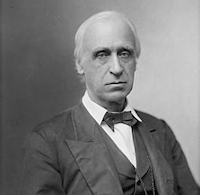City of New York.
Astor House, Oct 28, 1860
Dear Sir:
 I am here on business, but shall be at home in a few days.
I am here on business, but shall be at home in a few days.
Inclosed I send you a letter written by me and the comments upon it by the Herald of this city. In its endeavor to make something out of it the Herald assigns to me the position of a “confidential friend” to you.—There is nothing in the letter intimating that such a relation exists between us, and, certainly, no act or word of mine, on any occasion, could give rise to such an impression. I write you this for fear that you might, possibly, think I had said or done something to create such an impression, trusting believing, at the same time, that your acquaintance with me is sufficient to answer you that I could not stoop to an such an act.
The letter itself is but a plain statement of the “Republican Gospel” as I understand it; and, I think it will meet the approval of the Bishops of our Church everywhere!
You notice that Cobb1 and others have been here to try to create a panic among the money capitalists so as to affect the election in this State! It will give us strength instead of weakness. Our majority in this State will be over 80.000! In Pennsylvania it will be over 50.000! Our State will be over 20.000. In short we will have all the free States except possibly California.
I saw Wigfall,2 Senator from Texas, yesterday. He said that S. Carolina, Alabama & Mississippi would be out of the Union in less than 30 days! He is as rabid as a lunatic. They will cool off before the 4th of March next.
Yours truly,
Jno. D. Defrees
¹ Howell Cobb, a prominent Georgia politician, was a member of the U.S. House of Representaives (1845-51, 1855-57), governor of his state (1853-55) and Secretary of the Treasury in James Buchanan’s cabinet (1857-60). Though he favored sectional compromise and the preservation of the Union during the 1850s, Cobb became an advocate of secession after Lincoln’s election and resigned from his cabinet post a few days after issuing a public letter in which he urged secession. Cobb helped organize the Confederate government and served in the Confederate army, where he rose to the rank of major general.
² Louis Wigfall had been an advocate of secession since 1844 and moved from his native South Carolina to Texas in 1848. Wigfall was active in state politics and elected to the U.S. Senate in 1859, where he advocated a federal slave code for the territories and supported Breckinridge in the 1860 presidential campaign. During the Civil War, Wigfall attained the rank of brigadier general in the Confederate army and served in the Confederate Senate.